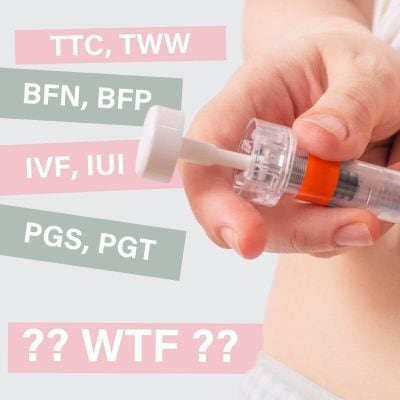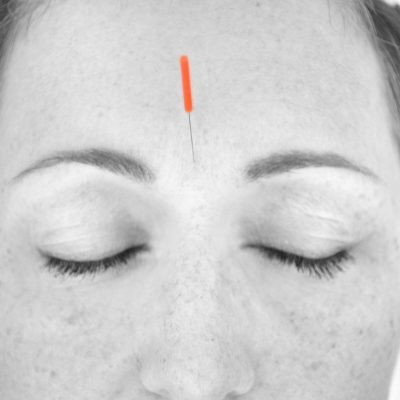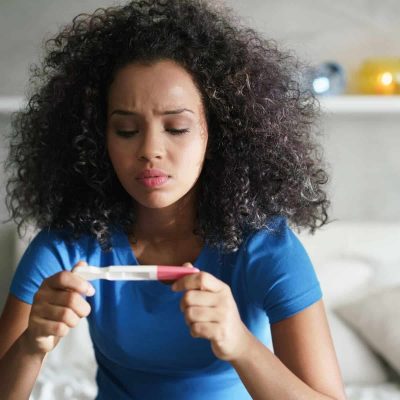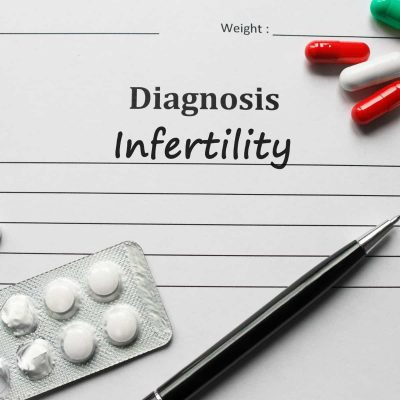
Infertility
As if trying to conceive wasn’t tricky enough on its own, an astounding 1-in-8 couples will struggle to get pregnant on their own. When a woman (or female identifying person) faces the inability to get pregnant, doctors will often diagnose that person as infertile.
The problem is, though, infertility is not a black and white diagnosis.
It comes in many different forms and affects people of all genders, races, and ethnicities. While in some cases infertility treatments can be simple, for others, the process can be mentally, physically, and financially draining.
To help you better understand the ins and outs of infertility treatments and conditions, we’ve put together this helpful guide that will give you a brief overview of the possibilities you might face on this journey.
Infertility Statistics
Before diving into the fertility treatment options available, it’s beneficial to understand the magnitude of the reach of infertility.
Despite what middle school health textbooks might have us believe, getting pregnant naturally is not as easy as 1,2,3. Far more future parents experience conception difficulties than you might think.
Take a look at these statistics for more information:
- Approximately 11.9% of women (or 7.4 million women) have received some type of fertility treatment.
- For healthy couples aged 29-33, the chances of conceiving each month naturally is only around 20-25%.
- About 10% of women living in the United States have trouble getting pregnant or staying pregnant.
- One-third of couples who have trouble getting pregnant experience either unexplained infertility or both male and female factor infertility.
One other hard statistic to consider is that not every couple trying unsuccessfully to get pregnant realizes their problems are from infertility. In fact, a research study conducted by SingleCare found that 48% of their participants didn’t know they were dealing with fertility troubles.
What Are Some Common Causes of Infertility in Women?
Now that you’re aware of how many people have infertility issues, you might be wondering why. Is there some common denominator that’s negatively affecting folks facing infertility?
Well, the answer is yes – there are several.
Some of the most common causes of infertility include:
Anovulation (Lack of Ovulation)
As regular ovulation cycles are a critical component in getting pregnant, women who don’t ovulate regularly, or at all, will have a hard time conceiving. Sadly, an estimated 30% of women who experience infertility cite ovulation irregularities as the primary factor.
Reproductive Structure Problems
When there are issues with the physical makeup of a woman’s reproductive organs, these can often lead to problems getting pregnant. Some common examples include:
- Misshapen Uterus
- Blocked Fallopian Tubes
- Uterine Polyps and Fibroids
- Uterine Scarring from Previous Infections, Injuries, or Surgery
The side effects of endometriosis can also lead to problems with a woman’s reproductive structure. This is one apparent reason that 30-40% of women with endometriosis also deal with infertility.
Polycystic Ovarian Syndrome (PCOS)
Approximately 5 – 10% of women are diagnosed with PCOS, a hormone disorder that causes problems with a woman’s ovaries and an imbalance in her levels of male and female hormones. While the precise cause of PCOS is unknown, research has found it a leading factor in many infertility cases.
Low Ovarian Reserves & Insufficiency
Some women will stop producing reproductive hormones and releasing eggs at a young age. While conditions like these don’t mean it’s impossible to get pregnant naturally, they can make conception more difficult. In fact, only around 5 – 10% of women who deal with premature ovarian failure will conceive on their own.
How Do You Know if You’re Dealing With Fertility Problems?
There’s certainly a difference between trying to conceive for a few months without success and being unable to get pregnant for years.
The issue is that many couples don’t understand what’s normal and what’s problematic regarding reproductive health and fertility.
Generally speaking, 84% of healthy, reproductive-aged women will conceive within one year if they’re having regular sex (approximately every 2 – 3 days) without protection. Many more may conceive within two years without medical interventions and treatment.
If you and your partner have been actively trying for more than a year without success, it’s worth talking to your doctor. Your physician will likely send you for some general fertility testing, such as blood work, pelvic exams, and ultrasounds, to rule out any potential problems.
Successful Treatment Options if Getting Pregnant Naturally Isn’t Working
There are several methods available to help hopeful parents conceive when it comes to female infertility treatment options.
Some of the most widely used treatments include:
Fertility Medications
For many doctors, the first place to start attempting to treat infertility is introducing a regimen of fertility medications to help women overcome their conception problems. For example, if a patient isn’t ovulating or is doing so irregularly, her doctor might prescribe a drug that can regulate her ovulation cycle.
A few of the most common infertility medications are:
- Clomiphene Citrate
- Synthetic hCG
- Follicle Stimulating Hormones
- Gonadotropins
Reproductive Surgeries
As reproductive structural problems are a common cause of infertility, doctors often try to remedy them through surgeries. For instance, they may perform surgeries to correct blocked fallopian tubes, remove uterine polyps, or eliminate uterine scar tissue.
Intrauterine Inception (IUI)
Many of us have either heard someone jokingly use the phrase “turkey baster method” regarding getting pregnant. What you might not realize, is that an IUI procedure is the medical form of this conception “technique.”
During an IUI, a man’s sperm is collected and placed directly into a woman’s uterus during ovulation.
Advanced Reproductive Technologies (ART)
If infertility medications, surgery, or IUI do not help you conceive, you may require more in-depth fertility treatments. Doctors refer to these as advanced reproductive technologies (ART) and they most commonly include in vitro fertilization (IVF).
During IVF cycles, women undergo various medication regimens to stimulate their ovaries and increase the overall health of their uterus.
Eggs are removed during an outpatient egg retrieval procedure and placed into a petri dish with previously collected sperm. Once the sperm fertilizes the eggs, the developing embryos are placed directly into the woman’s uterus during an embryo transfer procedure.
There are other types of ART treatments, as well. Another popular choice for couples who don’t respond well to traditional IVF is IVF with Intracytoplasmic Sperm Injection (ICSI).
This type of procedure is the same as a traditional cycle, except doctors will manually inject a man’s sperm directly into the woman’s eggs.
An Infertility Diagnosis Doesn’t Mean You Can’t Become a Parent
While the inability to get pregnant naturally without medical treatment can feel like a devastating loss, it’s crucial to understand that an infertility diagnosis is not the end of the road for most hopeful parents.
Studies show nearly 90% of couples who struggle with infertility will overcome their fertility problems through drug therapy or surgery. Thankfully, only around 3% of infertile couples and individuals require ART treatment.
Managing the common causes of infertility may take some effort. Still, we’re lucky to live in a society that has an astounding number of options to make treatment a valid possibility.
If you’re struggling to get pregnant on your own, take things one step at a time.
Find the fertility support you deserve and speak to your doctor about your options. The answer you’re searching for might be closer than you imagine.


IVF vs IUI: Which Option is Right For You?
In the world of trying to conceive (TTC) acronyms, different procedures, medications, and vocabulary can all start to sound the same: IVF, IUI, ICSI, TTC, 2WW – the list goes on and on. Take IVF vs. IUI, for example. While you might be familiar with the jargon, there’s a good chance you have no idea […]
Progesterone and Pregnancy: How Does One Affect the Other?
As we begin fertility testing and start examining our infertility treatment options, we’re likely to confront a kaleidoscope of new jargon, acronyms, and subject matters. Information on how progesterone and pregnancy go together is sure to be one of these things. It’s funny to think back to my first experiences with infertility. While I understood […]
Period or Implantation Bleeding? It’s Time to Break Down the Difference!
As someone who went through IVF to conceive, I think I speak for the vast majority of individuals struggling with infertility when I say that the wait for answers about a pregnancy test can be one of the most challenging experiences ever. Whether you’ve undergone an IUI, donor egg transfer, or traditional IVF cycle, you’re […]
Acupuncture for Fertility: Is This the Alternative Treatment You Need?
There’s a certain amount of “I’ll-do-anything-ness” that comes with infertility – an interest in doing anything you can to increase your chances of getting pregnant without the struggle of lengthy, drawn-out procedures that may or may not be successful. For example, I probably would’ve walked around on my hands for a week if someone had […]
Where to Find Help: Infertility Support Groups
Infertility often feels lonely and isolating. Even though 1 in 8 couples experiences infertility, many don’t talk about it, so it can seem hard to find the support you need. Thankfully, there are several face-to-face and online infertility support groups available that can make a difficult fertility journey a little bit easier. Here are our […]
How Accurate are Pregnancy Tests? Here’s Everything You Need to Know!
When it comes to something as life-changing as a pregnancy test, nobody has the time to mess with haphazard, second-rate results. As a woman who knows all too well how stressful the wait for those thin blue lines can be, I know that we all want to know that the pregnancy test we take will […]
Could Using Donor Eggs be the Next Step in Your Fertility Journey?
Not too long ago, my daughter asked me the most dreaded of all dreaded questions: “Where do babies come from?” or, more precisely, “How do babies get in bellies?” I was gobsmacked–but probably not for the reasons you’re thinking. Sure, explaining to my five-year-old the mechanics of sex is not something I was looking forward […]
PUPO, IVF, and The Search for Positivity After Embryo Transfer
The fertility world is filled with acronyms, and PUPO is one of the most common for IVF. Here's one mom's advice for the PUPO IVF experience.
